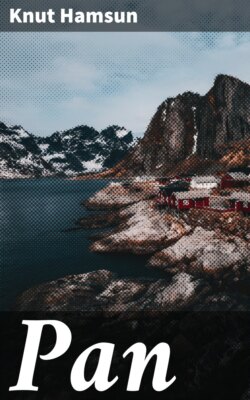Читать книгу Pan - Knut Hamsun - Страница 10
На сайте Литреса книга снята с продажи.
IV
ОглавлениеTable of Contents
I was never short of game those days, but shot all I cared to—a hare, a grouse, a ptarmigan—and when I happened to be down near the shore and came within range of some seabird or other, I shot it too. It was a pleasant time; the days grew longer and the air clearer; I packed up things for a couple of days and set off up into the hills, up to the mountain peaks. I met reindeer Lapps, and they gave me cheese—rich little cheeses tasting of herbs. I went up that way more than once. Then, going home again, I always shot some bird or other to put in my bag. I sat down and put Æsop on the lead. Miles below me was the sea; the mountainsides were wet and black with the water running down them, dripping and trickling always with the same little sound. That little sound of the water far up on the hills has shortened many an hour for me when I sat looking about. Here, I thought to myself, is a little endless song trickling away all to itself, and no one ever hears it, and no one ever thinks of it, and still it trickles on nevertheless, to itself, all the time, all the time! And I felt that the mountains were no longer quite deserted, as long as I could hear that little trickling song. Now and again something would happen: a clap of thunder shaking the earth, a mass of rock slipping loose and rushing down towards the sea, leaving a trail of smoking dust behind. Æsop turned his nose to the wind at once, sniffing in surprise at the smell of burning that he could not understand. When the melting of the snow had made rifts in the hillside, a shot, or even a sharp cry, was enough to loosen a great block and send it tumbling down …
An hour might pass, or perhaps more—the time went so quickly. I let Æsop loose, slung my bag over the other shoulder, and set off towards home. It was getting late. Lower down in the forest, I came unfailingly upon my old, well-known path, a narrow ribbon of a path, with the strangest bends and turns. I followed each one of them, taking my time—there was no hurry. No one waiting for me at home. Free as a lord, a ruler, I could ramble about there in the peaceful woods, just as idly as I pleased. All the birds were silent; only the grouse was calling far away—it was always calling.
I came out of the wood and saw two figures ahead, two persons moving. I came up with them. One was Edwarda, and I recognized her, and gave a greeting; the Doctor was with her. I had to show them my gun; they looked at my compass, my bag; I invited them to my hut, and they promised to come some day.
It was evening now. I went home and lit a fire, roasted a bird, and had a meal. To-morrow there would be another day …
All things quiet and still. I lay that evening looking out the window. There was a fairy glimmer at that hour over wood and field; the sun had gone down, and dyed the horizon with a rich red light that stood there still as oil. The sky all open and clean; I stared into that clear sea, and it seemed as if I were lying face to face with the uttermost depth of the world; my heart beating tensely against it, and at home there. God knows, I thought to myself, God knows why the sky is dressed in gold and mauve to-night, if there is not some festival going on up there in the world, some great feast with music from the stars, and boats gliding along river ways. It looks so!—And I closed my eyes, and followed the boats, and thoughts and thoughts floated through my mind …
So more than one day passed.
I wandered about, noting how the snow turned to water, how the ice loosed its hold. Many a day I did not even fire a shot, when I had food enough in the hut—only wandered about in my freedom, and let the time pass. Whichever way I turned, there was always just as much to see and hear—all things changing a little every day. Even the osier thickets and the juniper stood waiting for the spring. One day I went out to the mill; it was still icebound, but the earth around it had been trampled through many and many a year, showing how men and more men had come that way with sacks of corn on their shoulders, to be ground. It was like walking among human beings to go there; and there were many dates and letters cut in the walls.
Well, well …
